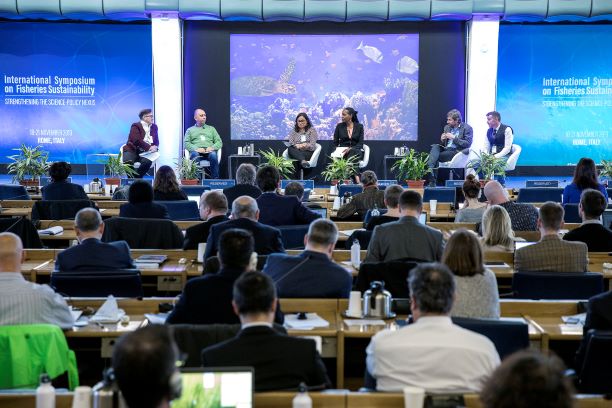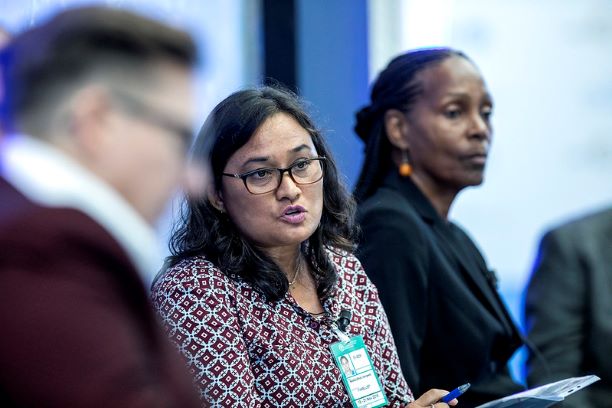“There is a growing interest in ensuring that the approaches used in fisheries and conservation, incorporate gender equity and social inclusion to ensure outcomes are fair, just and sustainable.”
Speaking as a panelist at a Session at the 2019 FAO International Symposium on Fisheries Sustainability in Rome, the Wildlife Conservation Society, Fiji Country Program Director, Dr. Sangeeta Mangubhai shared her views on how gender and social inclusion could enhance food security and biodiversity conservation.

Wildlife Conservation Society, Fiji Country Program, Director, Dr. Sangeeta Mangubhai as a panelist at a Session at the 2019 FAO International Symposium on Fisheries Sustainability in Rome. Credit: FAO
She elaborated on existing approaches for gender and social inclusion and discussed what needed to be improved further for effective outcomes in creating sustainable fisheries.
“When we talk about people, we are talking about both men and women who play different and complementary roles when it comes to biodiversity conservation and food security,” Dr. Mangubhai said. She also added that communities were not homogenous and were made up of diverse social or ethnic groups.
“It is critical to understand ‘intersectionality’ which where social categorizations such as ethnicity, class, and gender can overlap and can compound inequalities. Beyond a moral issue, inequalities can create obstacles that if not understood and addressed, will ultimately make biodiversity and fisheries interventions ineffective,” Dr. Mangubhai said.
But if not careful, the very interventions can reinforce or aggravate inequalities.
For example, if a marine protected area is placed where women glean, this can impact food security, as the women will need travel further or work harder to feed their families.

Wildlife Conservation Society Fiji Country Program Director, Dr. Sangeeta Mangubhai discusses gender equity and social inclusion for sustainable fisheries. Photo: FAO
In addressing the international conservationists, Dr. Mangubhai said moving forward, “it is important that gender issues are on the FAO Committee on Fisheries agenda, and the development of a strategy for mainstreaming gender equity and social inclusion in programmes and in statistics, policies and international instruments should be discussed.”
She has called on the conservationists to “move beyond guidelines and lip-service to provide practical tools to implement joint biodiversity protection and fisheries management objectives, using gender and social inclusive approaches that are unique to their social-cultural and geographic setting.”
“We should not do gender and social inclusion because we have to, but because it is instrumental to reach both food security and conservation objectives, and it is morally the right thing to do,” Dr. Mangubhai said.
Fisheries sector is considered to be at an important crossroad today. While it is significantly contributing to daily food security and livelihoods of many who depend on it, the growing demand continues to affect the future of marine and inland fisheries.
The 2019 International Symposium on Fisheries Sustainability currently underway at the FAO Headquarters in Rome, is set to identify pathways to strengthen the science and policy interplay in fisheries production, management and trade, based on principals of sustainability, for improved outcomes in practice.
The debates and conclusions of the Symposium will prepare the way for development of a new vision for capture fisheries, outlining how the sector can respond to the complex and rapidly changing challenges facing society.